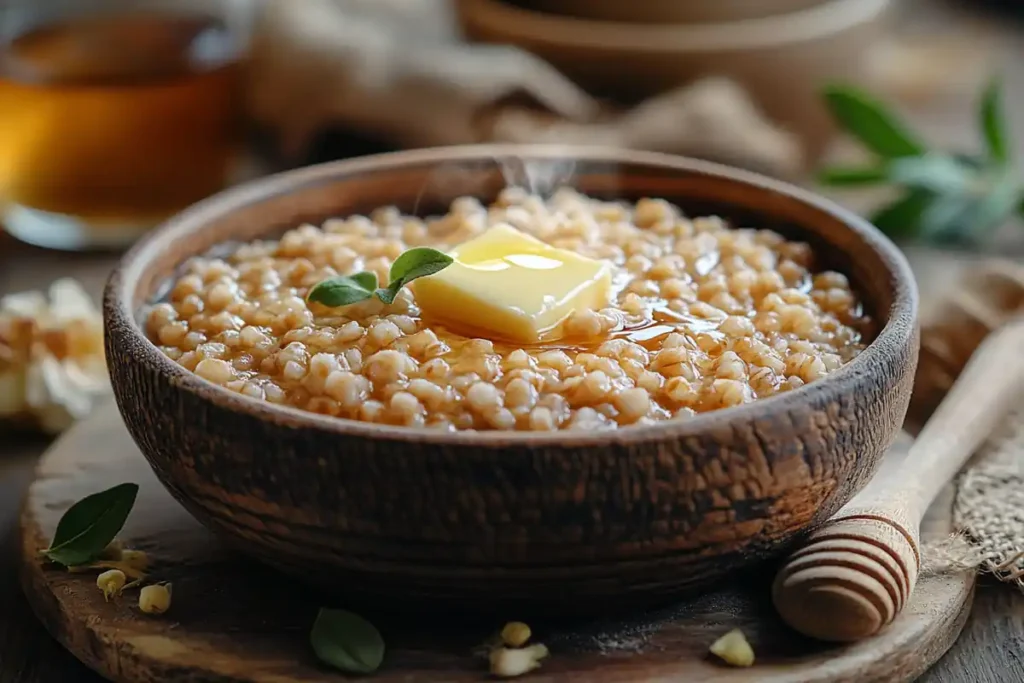Introduction
Breakfast is often called the most important meal of the day, and in Russia, it holds a special place in the culture. A traditional Russian breakfast is hearty, nutritious, and deeply rooted in history, featuring a mix of warm porridge, pancakes, dairy products, and tea. While modern influences have brought new breakfast trends, many Russian families still enjoy classic dishes passed down through generations.
In this article, we’ll explore the most popular Russian breakfast foods, traditional beverages, and how breakfast habits have evolved. You’ll also learn how to prepare an authentic Russian breakfast at home. Whether you’re a food enthusiast or just curious about Russian cuisine, this guide will give you a taste of how Russians start their mornings.
1: Introduction to Russian Breakfast
What is a Typical Russian Breakfast?
A typical Russian breakfast is a balance of simplicity and nourishment. Unlike Western breakfasts filled with processed cereals and sugary pastries, Russian mornings usually start with warm, homemade foods. Popular choices include kasha (porridge), blini (pancakes), syrniki (cottage cheese pancakes), and black bread with cheese and butter.
Eggs also play a role, whether fried, boiled, or turned into an omelet. Some prefer a light meal with yogurt or kefir (a fermented dairy drink) alongside fresh berries or honey. Hot tea is a breakfast staple, often served with a slice of lemon or honey. Coffee, while not as traditional, has gained popularity in urban areas.
The Importance of Breakfast in Russian Culture
In Russian households, breakfast isn’t just a meal—it’s a tradition. Historically, Russian breakfasts were designed to provide energy for a day of hard work, especially in cold weather. Farmers, factory workers, and students all needed a filling start to power through their mornings.
Even today, Russian families value a warm breakfast. Parents often prepare homemade syrniki or porridge for their children before school. Weekends are a time for larger breakfasts, where multiple dishes like blini, eggs, and jam are served together.
How Russian Breakfast Has Evolved Over Time
While traditional foods like kasha and blini remain popular, Russian breakfasts have evolved with globalization. In larger cities, Western-style breakfasts like toast, cereal, and scrambled eggs are more common. Cafés now serve avocado toast and croissants alongside classic Russian dishes.
However, many Russians still prefer hearty, homemade breakfasts over store-bought alternatives. The focus remains on natural, filling ingredients like grains, dairy, and fresh produce. Whether simple or elaborate, a Russian breakfast continues to be a delicious way to start the day.
2: Popular Traditional Russian Breakfast Foods
A Russian breakfast is all about warmth, comfort, and simple, natural ingredients. Unlike Western breakfasts that lean heavily on processed cereals, Russian mornings start with homemade dishes that have been passed down for generations. Let’s explore the most popular traditional Russian breakfast foods.
Blini – The Iconic Russian Pancakes
No Russian breakfast is complete without blini—thin, crepe-like pancakes that are a staple in Slavic cuisine. These delicate pancakes are usually served with sour cream, jam, honey, or even caviar for a more luxurious touch. Some families prefer to make them with buckwheat flour, giving them a nutty taste.
Blini are often compared to French crêpes, but they have a distinct Russian character. They can be filled with sweet or savory ingredients, from condensed milk and berries to smoked salmon and cottage cheese.
Syrniki – Russian Cottage Cheese Pancakes

If you love fluffy, cheesy pancakes, you’ll adore syrniki. These thick pancakes are made with farmer’s cheese (tvorog), eggs, flour, and sugar, creating a soft and slightly tangy taste. Traditionally, they are pan-fried until golden brown and served with sour cream, honey, or fruit preserves.
Syrniki are not only a breakfast favorite but also a common snack or dessert in Russian households. Their high protein content and creamy texture make them a satisfying start to the day.
Kasha – The Staple Russian Porridge

If there’s one breakfast dish that every Russian child grows up eating, it’s kasha. This hearty porridge can be made from different grains, including buckwheat, semolina, oatmeal, or millet. It’s typically cooked with milk or water and sweetened with honey, sugar, or fresh berries.
Buckwheat kasha, known as grechka, is particularly popular because it’s packed with nutrients and has a nutty, earthy flavor. Some Russians prefer savory versions of kasha, adding butter, salt, or even cheese.
Oladushki – Fluffy Russian Pancakes
Oladushki are another beloved breakfast treat. These small, thick pancakes are similar to American pancakes but have a slightly different texture due to the use of kefir or yogurt in the batter. The result? A light and airy pancake that’s delicious with honey, sour cream, or fresh fruit.
Unlike blini, which are thin and delicate, oladushki are soft, spongy, and perfect for soaking up sweet toppings.
Russian Black Bread with Butter and Cheese
Bread plays a crucial role in Russian cuisine, and breakfast is no exception. Many Russians start their day with a slice of black rye bread topped with butter, cheese, or cold cuts.
This type of bread has a dense texture and a slightly sour taste, making it different from Western white bread. It’s high in fiber and pairs well with cottage cheese, smoked salmon, or even just a drizzle of honey.
Egg-Based Breakfasts – Omelets and Boiled Eggs
While kasha and pancakes are common, eggs also make an appearance at the Russian breakfast table. Some Russians enjoy boiled eggs with salt and butter, while others prefer a fluffy omelet with fresh herbs and cheese.
Eggs are often paired with pickled cucumbers, tomatoes, or sourdough bread, creating a well-rounded meal.
3: Russian Breakfast Beverages
Breakfast isn’t just about food—it’s also about the drinks that complete the meal. In Russia, hot beverages are an essential part of the morning routine.
Traditional Russian Tea – The Morning Essential

Tea is the undisputed king of Russian breakfast beverages. Whether black, green, or herbal, tea is deeply ingrained in Russian culture. Black tea with lemon and honey is a classic morning drink, providing a warm and soothing start to the day.
Many Russians use a samovar, a traditional metal container used to heat and serve tea, to keep tea warm for extended periods.
Kefir – A Fermented Dairy Drink for Breakfast
Kefir, a fermented milk drink, is a breakfast staple in Russia. It has a slightly tangy taste and is packed with probiotics, making it a healthy way to start the day. Some people drink kefir on its own, while others mix it with berries, honey, or oats for a filling meal.
It’s often used as a lighter alternative to yogurt and is believed to aid digestion and boost immunity.
Kompot – A Refreshing Fruit Drink
Kompot is a traditional Russian fruit drink made by boiling berries or dried fruits with sugar and water. It’s commonly served chilled, making it a refreshing addition to breakfast. Apple, cherry, and strawberry kompot are among the most popular flavors.
Unlike store-bought juices, kompot contains no artificial sweeteners or preservatives, making it a healthier choice for those looking to reduce their sugar intake.
4: A Modern Take on Russian Breakfast
As times change, so do breakfast habits. While many Russians still enjoy traditional morning meals, modern lifestyles and global influences have introduced new breakfast options. Let’s explore how Russian breakfast has adapted to contemporary tastes.
Quick Russian Breakfast Options for Busy Mornings
In today’s fast-paced world, not everyone has time to prepare a full breakfast of blini or kasha. Many Russians have turned to quick and convenient options that still maintain the essence of traditional meals.
- Yogurt with nuts and berries – A fast, protein-packed choice that mimics traditional dairy-based breakfasts.
- Cheese or ham sandwiches on black bread – A simple, filling alternative to a sit-down meal.
- Oatmeal with honey and dried fruit – A quicker version of kasha, often prepared with instant oats.
- Pastries and coffee on the go – While not traditionally Russian, croissants, pirozhki (stuffed buns), and sweet rolls have become popular quick breakfasts.
These modern options allow people to enjoy a Russian breakfast without spending too much time in the kitchen.
Western Influences on Russian Breakfasts Today
Globalization has introduced Western breakfast trends into Russian cuisine. In urban areas, people now enjoy:
- Avocado toast and smoothies – Inspired by global health trends, these are popular in cafes and homes alike.
- Scrambled eggs and bacon – A shift from boiled eggs to Western-style cooked breakfasts.
- Cereal and granola – While not common in traditional homes, they have gained popularity among younger generations.
Despite these changes, traditional Russian breakfasts remain popular, especially among older generations and families who value home-cooked meals.
How Russian Breakfast Differs by Region
Russia is a vast country, and breakfast habits can vary based on regional traditions and climate.
- In Siberia, hearty meals like buckwheat porridge and meat pies are common due to the cold weather.
- In Moscow and St. Petersburg, cafes serve European-style breakfasts alongside traditional Russian options.
- In the Caucasus region, breakfast might include cheese-filled pastries like khachapuri.
- In rural areas, homemade dairy products, such as fermented milk drinks and fresh cheese, play a bigger role.
Despite these differences, Russian breakfast always reflects a balance of tradition and practicality.
5: How to Make a Classic Russian Breakfast at Home
If you want to experience a traditional Russian breakfast, you don’t have to travel to Russia—you can make it at home! Here’s how to prepare some of the most popular morning dishes.
Essential Ingredients for a Traditional Russian Breakfast
Before you start cooking, stock up on these essential ingredients found in Russian kitchens:
- Buckwheat or oats – For making kasha (porridge).
- Farmer’s cheese (tvorog) – A key ingredient in syrniki and a common breakfast spread.
- Flour, eggs, and milk – Needed for making blini and oladushki.
- Sour cream and honey – Popular toppings for pancakes and porridge.
- Black bread – A staple for sandwiches with butter, cheese, or jam.
- Tea and kefir – The go-to beverages for a Russian breakfast.
Step-by-Step Guide to Making Blini and Syrniki
Blini Recipe
- Mix 2 eggs, 2 cups of milk, 1 cup of flour, a pinch of salt, and 1 tbsp of sugar.
- Whisk the batter until smooth, then let it rest for 10-15 minutes.
- Heat a lightly oiled pan over medium heat.
- Pour a small amount of batter, spreading it thinly.
- Cook for 1-2 minutes per side until golden brown.
- Serve with sour cream, jam, or honey.
Syrniki Recipe
- Combine 1 cup of farmer’s cheese, 1 egg, 3 tbsp of flour, 1 tbsp of sugar, and a pinch of salt.
- Mix until a dough forms, then shape into small patties.
- Heat a pan with butter or oil over medium heat.
- Fry for 3-4 minutes per side until golden brown.
- Serve with sour cream and fresh berries.
A Simple Russian Breakfast Meal Plan
If you want to enjoy a balanced Russian breakfast, try this simple meal plan:
- Monday: Kasha with honey and black tea.
- Tuesday: Blini with jam and a cup of kefir.
- Wednesday: Syrniki with sour cream and fresh berries.
- Thursday: Black bread with butter, cheese, and hot tea.
- Friday: Oladushki (fluffy pancakes) with honey.
- Saturday: Soft-boiled eggs with pickles and rye bread.
- Sunday: A mix of blini, eggs, and porridge for a big weekend breakfast.
For more delicious breakfast ideas, check out our Sweet Cream Pancakes Recipe on Fannie Recipes!
6: FAQs – Common Questions About Russian Breakfast
When it comes to Russian breakfast, many people have questions about traditional foods, customs, and modern trends. Here are answers to some frequently asked questions.
What do Russians eat for breakfast daily?
Most Russians enjoy a simple, filling breakfast that often includes porridge (kasha), pancakes (blini or syrniki), eggs, or black bread with butter and cheese. Hot tea is the most common morning drink, though some people prefer coffee or kefir.
Is Russian breakfast different on weekends and special occasions?
Yes! Weekday breakfasts tend to be quick and simple—kasha, eggs, or a sandwich. However, weekends and holidays often include larger, more elaborate meals with blini, syrniki, or a variety of homemade pastries. Families may also enjoy jam, honey, and fresh berries as toppings.
What is the most popular Russian breakfast dish?
It depends on personal preference, but kasha, blini, and syrniki are among the most beloved breakfast options. Kasha is a staple, especially for children, while blini and syrniki are enjoyed on special mornings or weekends.
Is Russian breakfast usually sweet or savory?
Russian breakfast can be both! While porridge, pancakes, and syrniki are often sweetened with honey, sugar, or jam, many Russians also prefer savory options like eggs, black bread with cheese, or even fish and pickles.
7: Conclusion – The Timeless Charm of Russian Breakfast
A Russian breakfast is more than just a meal—it’s a tradition filled with comfort, warmth, and simple ingredients that nourish the body and soul. Whether it’s a quick bowl of kasha before work or a weekend feast of blini and syrniki, Russian breakfasts reflect a deep connection to history and culture.
Despite modern influences, classic Russian breakfast foods remain a staple in many households. The balance of grains, dairy, eggs, and tea creates a nutritious and satisfying start to the day. Even as younger generations experiment with Western trends like avocado toast and granola, traditional dishes continue to be passed down.
If you’re curious to try a Russian breakfast at home, start with a simple recipe like blini or kasha. Pair it with a cup of black tea or kefir, and you’ll get a true taste of Russian morning traditions.
No matter how busy life gets, a good breakfast remains the foundation of a great day. And in Russia, that means starting with wholesome, homemade food that brings people together.
8: Health Benefits of Russian Breakfast
A Russian breakfast is not just delicious—it’s also packed with essential nutrients that fuel the body. Traditional Russian meals focus on natural, whole foods that provide energy, protein, and vitamins for a productive day.
Why Russian Breakfast is a Healthy Choice
Unlike processed cereals and sugary pastries common in Western breakfasts, a Russian breakfast is built on wholesome ingredients like grains, dairy, and fresh produce. Here’s why it’s a great choice for a balanced diet:
- High in fiber – Kasha (buckwheat, oatmeal, or millet porridge) is rich in fiber, which aids digestion and keeps you full longer.
- Protein-packed – Syrniki, eggs, and dairy products provide high-quality protein, which helps build muscles and sustain energy.
- Low in processed sugar – While some breakfasts include honey or jam, they are much lower in refined sugar compared to commercial cereals and pastries.
- Gut-friendly foods – Kefir and ryazhenka (fermented milk) contain probiotics, which improve digestion and gut health.
- Rich in healthy fats – Black bread with butter, cheese, or fish provides essential fats for brain function and heart health.
Traditional vs. Modern Breakfast: Which is Healthier?
While modern Russian breakfasts may include Western-style cereals, toast, and coffee, the traditional approach is often healthier due to its focus on natural ingredients and home-cooked meals.
However, balance is key! A healthy Russian breakfast can combine both worlds—a bowl of kasha with berries, a boiled egg, and a cup of tea provides nutrients and energy without excessive sugar or artificial additives.
By choosing homemade meals over processed foods, you can enjoy the full benefits of a Russian breakfast while maintaining a nutritious diet.
9: Russian Breakfast Around the World
Russian cuisine has traveled far beyond its borders, influencing breakfast traditions in different parts of the world. While some regions have fully embraced classic Russian dishes, others have added their own twists to these morning meals.
Where to Find Russian Breakfast Abroad
Many Russian communities worldwide have preserved their breakfast traditions, and you can find authentic Russian breakfasts in major cities like New York, London, and Berlin. Russian restaurants and bakeries serve blini, syrniki, and kasha, often with local ingredients and adaptations.
In Eastern Europe, countries like Ukraine, Belarus, and Latvia have similar breakfast traditions, often featuring porridge, pancakes, and dairy-based meals. Some variations include:
- Ukraine – Deruny (potato pancakes) and syrniki are popular breakfast items.
- Poland – Farmers’ cheese pancakes and porridge are commonly eaten in Polish households.
- Baltic States – Kefir, rye bread, and fresh berries are staple breakfast items.
How Russian Breakfast is Adapting to Global Trends
As people worldwide seek healthier and more diverse breakfast options, Russian cuisine is gaining popularity in modern cafés and food trends. Some interesting adaptations include:
- Blini with Nutella and bananas – A fusion of Russian and Western flavors.
- Syrniki with maple syrup – A twist on American pancakes with a Slavic touch.
- Savory kasha bowls – Buckwheat or oatmeal topped with avocado, nuts, and seeds.
With a mix of tradition and innovation, Russian breakfast is making its mark on the global food scene, proving that hearty, homemade meals are always in style.
Conclusion: The Timeless Charm of Russian Breakfast
A Russian breakfast is more than just a morning meal—it’s a reflection of tradition, culture, and nourishment. Rooted in wholesome, natural ingredients, Russian breakfasts provide the perfect balance of flavor, nutrition, and comfort. Whether it’s a simple bowl of kasha, fluffy syrniki, or delicate blini, each dish tells a story of generations-old culinary heritage.
Despite the influence of modern fast food and Western breakfast trends, classic Russian morning meals remain popular, offering both health benefits and deep cultural significance. From the warmth of a hot cup of black tea to the satisfaction of homemade pancakes and porridge, these dishes fuel the body and bring people together.
Whether you’re exploring Russian cuisine for the first time or revisiting childhood flavors, there’s something special about starting your day with a traditional Russian breakfast. Why not try making blini, kasha, or syrniki at home and experience a taste of Russia’s rich breakfast culture?
No matter where you are in the world, a hearty, homemade breakfast is always a great way to begin the day—and in Russia, that means enjoying food that is both simple and deeply satisfying.

